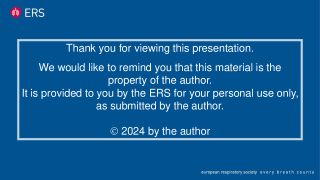Chairs: Prof. Dr Rudolf M. Huber (Munich, Germany), Prof. Dr Rafael E. de la Hoz (New York, United States)
Speakers: Dr Stamatoula Tsikrika (Athens, Greece), Dr Om Prakash Kurmi (Coventry, United Kingdom), Prof. Dr Isabella Annesi-Maesano (Montpellier, France)
Fees: Free for ERS members / €10 for non-members
Find out more about becoming a member
Overview
Lung cancer is one of the most frequent and also one of the most lethal malignancies throughout the world.
The lungs are some of the organs most directly and constantly exposed to the external environment and thus to environmental and occupational carcinogens. Although (first-hand) tobacco smoking is causally associated with the majority of the cases, and thus smoking cessation can be expected to reduce morbidity and mortality, about 20% is unrelated to that risk factor. It is very important for clinicians (more so those with a respiratory health focus) to be aware of other environmental exposures that increase the lung cancer burden throughout the world.
A previous webinar reviewed occupational carcinogen exposures. In this webinar, we propose to review three very important ones: second-hand tobacco smoke exposure, biomass/indoor air pollution and outdoor air pollution, all deemed as definite lung carcinogens by the International Agency for Research on Cancer (IARC) of the World Health Organization (WHO).
Educational aims
The panellists will present:
- The weight of the epidemiological evidence, based primarily on the extensive systematic reviews of the International Agency for Research on Cancer, plus additional, more recent, and/or novel sources.
- The nature and prevalence of the exposures, preferably at a global level (i.e., in different contexts).
- Any evidence of impact of mitigation efforts, at the individual or the public health level.
Topics
This webinar will focus on three well characterised and highly prevalent environmental exposures causally associated with lung cancer. The topics are as follows.
- Second-hand smoke - Stamatoula Tsikrika
- Biomass/indoor air pollution - Om P. Kurmi
- Outdoor air pollution - Isabella Annesi-Maesano
Target audience
- Physicians
- Nurses
- Health educators
- Investigators
- Trainees with a focus in respiratory diseases, epidemiology, and public health
Learning outcomes
Following this webinar, participants will be able to
- Describe the lung cancer risk associated with second-hand smoke exposure
- Describe the lung cancer risk associated with exposure to biomass burning and indoor air pollution
- Describe the lung cancer risk associated with exposure to outdoor pollutants
CME credit
An application for accreditation of this webinar has been made to the European Board for Accreditation in Pneumology (EBAP) for 1 CME credit per 1-hour attendance. If accredited, the CME credit will be granted upon attendance of at least 60 minutes during the live webinar only.
What is a webinar?
A webinar closely simulates a lecture-based teaching experience. The speaker can interact with the audience, just as in a classroom setting. During the webinar, you will be asked to share your opinion on issues related to the topic using interactive polls.
All participants will be able to hear the lecturer and see the slides throughout the presentation. As a participant you will be able to pose questions or discuss ideas with the other participants via the text chat facility and the speaker will respond to the questions via the microphone.
Login guidelines
More information will be communicated in due course.
- Please log in to the webinar 20 minutes before it is scheduled to commence. If you have any technical difficulties whilst trying to log in or during the session please contact e-learning@ersnet.org.
- Check Central European Time.
- To achieve the best quality, we recommend to avoid downloading anything from the internet during your connection to the lecture and stopping all other programmes.
- Please also ensure that your audio settings are not set to mute and adjust the volume to a comfortable level.

